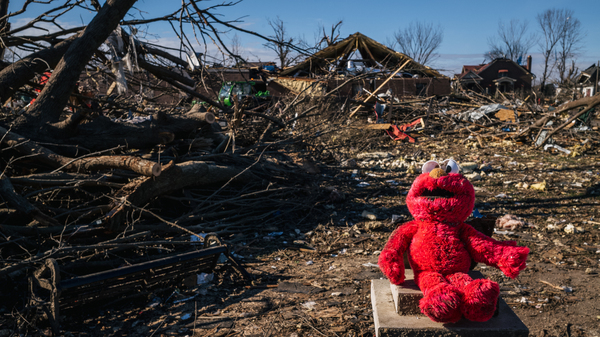3:20 PM 12/14/2021 - Powerful Storm Slams Southland; Brings Drenching Rain, Snow | NATO again warns Russia over costs of any possible Ukraine invasion | Feds Says Four FBI Agents Had Sex With Prostitutes Oversees Then Lied
Four FBI agents 'had sex with prostitutes while on assignment overseas and lied about it' https://t.co/V6FQYutzii
— Daily Mail US (@DailyMail) December 15, 2021
#FBI: HIRED GUNS LONG FOR HIRED LOVE, NATURALLY ...
Powerful Storm Slams Southland; Brings Drenching Rain, Snow
A strong storm system that struck Northern California over the weekend worked its way down the coast and has hit the Southland. It is expected to drench the region with rain throughout the day Tuesday, raising the risk of flooding and debris flows in recent wildfire burn areas.

Kentucky Gov. Andy Beshear said 74 people were confirmed killed and more than 100 are still unaccounted for. The victims who have been identified range in age from 2 months to 98 years.
(Image credit: Brandon Bell/Getty Images)


The explosion of cases has been driven by the dominant delta variant, but community spread of the heavily mutated omicron strain has added another level of concern for leaders and health officials.


- House to vote to refer Mark Meadows to Justice Department for contempt of Congress CNN
- Meadows moves to center of Jan. 6 probe | TheHill The Hill
- Mark Meadows' Personal Cell Is Becoming a Personal Hell The Daily Beast
- Mark Meadows is an embarrassment to NC. Congress should take a hard line with him. Raleigh News & Observer
- January 6 committee to vote Monday on holding Meadows in contempt of Congress CNN
- View Full Coverage on Google News
Prime Minister Ariel Henry declared three days of national mourning in reaction to Monday night’s explosion in the northern city of Cap-Haitien.
» Subscribe to NBC News: http://nbcnews.to/SubscribeToNBC
» Watch more NBC video: http://bit.ly/MoreNBCNews
NBC News Digital is a collection of innovative and powerful news brands that deliver compelling, diverse and engaging news stories. NBC News Digital features NBCNews.com, MSNBC.com, TODAY.com, Nightly News, Meet the Press, Dateline, and the existing apps and digital extensions of these respective properties. We deliver the best in breaking news, live video coverage, original journalism and segments from your favorite NBC News Shows.
Connect with NBC News Online!
NBC News App: https://apps.nbcnews.com/mobile
Breaking News Alerts: https://link.nbcnews.com/join/5cj/breaking-news-signup?cid=sm_npd_nn_yt_bn-clip_190621
Visit NBCNews.Com: http://nbcnews.to/ReadNBC
Find NBC News on Facebook: http://nbcnews.to/LikeNBC
Follow NBC News on Twitter: http://nbcnews.to/FollowNBC
Follow NBC News on Instagram: http://nbcnews.to/InstaNBC
#News #Haiti #NBCNews
James D. Morgan/Getty Images
- Omicron raises questions about how much more infectious or dangerous the coronavirus can get.
- In scientists' best-case scenario, the virus could become endemic by the end of the decade.
- But in a worst-case scenario, a more lethal variant could spill over from animals to humans.
For nearly six months, Delta seemed capable of vanquishing all other coronavirus variants — so much so that scientists wondered whether the virus had reached the apex of its ability to infect humans.
In November, Omicron threw scientists for a loop: After driving up cases in South Africa, it spread to dozens of countries seemingly overnight. Early lab studies now suggest that Omicron increases the risk of reinfection relative to other strains and is better than the original virus at evading antibodies from two vaccine doses.
Now scientists are wondering: Is Omicron as infectious as it gets?
There's no easy answer, but scientists have a few guesses about the virus' future. In the best-case scenario, they say, the coronavirus will become endemic, meaning cases will persist at low levels, perhaps resulting in seasonal outbreaks of relatively mild disease. In a middle-of-the-road scenario, the virus could get even better at resisting vaccines, exposing more vaccinated people to severe illness. And in a frightening scenario, the virus could recombine with another coronavirus to form a more lethal, hybrid variant.
Some scientists aren't betting on that last outcome.
The virus "seems unlikely to do much worse than what we're already dealing with," Vaughn Cooper, director of the Center for Evolutionary Biology and Medicine at the University of Pittsburgh, told Insider.
Still, he added, "I keep getting fooled."
The best-case scenario: The virus becomes a 'seasonal annoyance'
Reuters/Brendan McDermid
Viruses have one major objective: survival. Scientists generally agree that the best way for the current coronavirus, SARS-CoV-2, to survive long-term is to become endemic in the population, similar to the way influenza or other human coronaviruses have evolved.
Becoming more lethal could put the virus at a disadvantage, since people need to stay alive to keep infecting others. And because the virus is already skilled at transmitting, future variants may not need to drastically alter how the virus behaves.
"Are we playing whack-a-mole forever with SARS-CoV-2? No. It's going to become an endemic coronavirus that is going to become a seasonal annoyance," Cooper said, adding, "That's going to happen this decade, maybe before the end of this decade."
While Cooper think some years will have worse coronavirus outbreaks than others, overall he expects vaccines to continue to ward off severe disease. That's because antibodies aren't the body's only form of protection: White blood cells known as T cells and B cells also remember foreign invaders, often for longer periods than antibodies.
"One thing I am confident about is that my three doses of the original vaccine has created a diversity of cellular immune responses that are going to protect me against the virus several years from now," Cooper said. "I will bet good money on that. I may get sick, but it's not going to make me really sick because my T cells and B cells have seen something like this before."
The middle-of-the-road scenario: Vaccines become less effective as the virus evolves
Mark Lennihan/AP Photo
The coronavirus may ultimately encounter a limit to how much it can spread when everyone capable of being infected has some degree of immunity. At that point, the virus might have to get better at circumventing the body's immune defenses — whether from vaccines or natural infection — to stay alive.
"The easiest way for the virus to cause new epidemics is to evade immunity over time," Adam Kucharski, a mathematical epidemiologist at the London School of Hygiene and Tropical Medicine, told Nature in December. "That's similar to what we see with the seasonal coronaviruses."
In that case, widespread immunity could put pressure on the virus to form new variants that render vaccines less and less effective.
"The evolutionary forces that could undermine vaccination — those are coming," Andrew Read, who studies the evolution of infectious diseases at Pennsylvania State University, told Insider. The virus, he added, "is a long way from having tapped all of its own mutational potential."
The worst-case scenario: The virus combines with another coronavirus inside an animal, then spills back into humans
Ben Hasty/MediaNews Group/Reading Eagle/Getty Images
As the coronavirus continues to spread widely, it's possible that an animal could get infected with two coronaviruses at once: the current virus, SARS-CoV-2, plus another coronavirus found in wildlife. In a nightmare scenario, those viruses might form a hybrid variant that spills over to the human population and is more lethal than its predecessors.
"We've got an awful lot of SARS-2 around, so the potential for something to spill into humanity and recombine with SARS-2 is pretty high," Read said.
Already this century, three coronaviruses capable of causing severe disease — SARS-CoV, MERS-CoV, and SARS-CoV-2 — have spilled over from animals to humans. Coronaviruses also have a high capacity to recombine, Read said. A May study found evidence of a recombinant coronavirus in a hospitalized person with pneumonia. The study's researchers traced the origin of the virus to coronaviruses in cats and dogs. Although scientists are still investigating the origins of SARS-CoV-2, a December 2020 study suggested that the virus emerged from a recombination of bat and pangolin coronaviruses.
So the possibility of another spillover event "seems pretty worrying to me," Read said.
But Cooper cautioned that it's rare for a human or animal to be infected with two viruses at once.
"We should be worried about it, but where does it stand among our worries? It's still quite low," he said, calling recombination "more of a long-term concern."
"Most recombination events fail because the parts don't work well together," Cooper said. "But if we've learned anything about this pandemic, when you have really huge numbers, really weird things happen."
Both Cooper and Read pointed to white-tailed deer as a species to watch closely, after a coronavirus outbreak tore through the US white-tailed deer population last winter.
"There are white-tailed deer all over the place in my neighborhood outside of Pittsburgh and I can't help but look at them as all having had, or currently having, SARS-CoV-2," Cooper said. "The virus is evolving in them, too. We know this. How is it evolving? We don't know."
Stream your PBS favorites with the PBS app: https://to.pbs.org/2Jb8twG
Find more from PBS NewsHour at https://www.pbs.org/newshour
Subscribe to our YouTube channel: https://bit.ly/2HfsCD6
Follow us:
Facebook: http://www.pbs.org/newshour
Twitter: http://www.twitter.com/newshour
Instagram: http://www.instagram.com/newshour
Subscribe:
PBS NewsHour podcasts: https://www.pbs.org/newshour/podcasts
Newsletters: https://www.pbs.org/newshour/subscribe

An Arctic temperature record of more than 100 Fahrenheit (38 Celsius) was reached in a Siberian town last year during a prolonged heatwave that caused widespread alarm about the intensity of global warming
#News #Reuters #ArcticHeat #Heatwave
Subscribe: http://smarturl.it/reuterssubscribe
Reuters brings you the latest business, finance and breaking news video from around the globe. Our reputation for accuracy and impartiality is unparalleled.
Get the latest news on: http://reuters.com/
Follow Reuters on Facebook: https://www.facebook.com/Reuters
Follow Reuters on Twitter: https://twitter.com/Reuters
Follow Reuters on Instagram: https://www.instagram.com/reuters/?hl=en

White House press secretary Jen Psaki holds a Tuesday news briefing. Subscribe to The Washington Post on YouTube: https://wapo.st/2QOdcqK
Follow us:
Twitter: https://twitter.com/washingtonpost
Instagram: https://www.instagram.com/washingtonpost/
Facebook: https://www.facebook.com/washingtonpost/

A warning: viewers may find some of the images used in this story disturbing.
Brides kidnapped, forced marriages, wife-beating, and murder. Women in Kyrgyzstan have suffered decades of violence in the male-dominated country.
International observers say it is unlikely to get better, which is being reflected in Parliament, with fewer female MPs voted in in last month's elections.
And they say they have lost further support because fewer female MPs are in the new Parliament.
Al Jazeera’s Zein Basravi reports from the capital, Bishkek.
- Subscribe to our channel: http://aje.io/AJSubscribe
- Follow us on Twitter: https://twitter.com/AJEnglish
- Find us on Facebook: https://www.facebook.com/aljazeera
- Check our website: https://www.aljazeera.com/
# Kyrgyzstan #DomesticViolence #KyrgyzstanWomen


 audio/mpeg
audio/mpeg 

Comments
Post a Comment